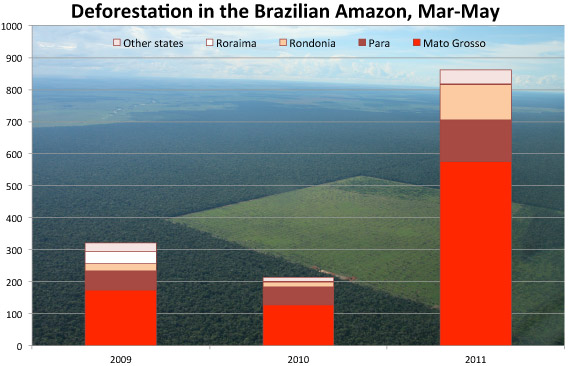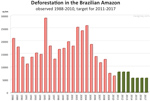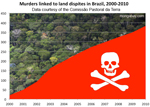|
Perspectives on proposed changes to Brazil’s Forest Code
|
In May Brazil’s House of Representatives passed a bill that will reform the country’s Forest Code, which requires farmers and ranchers in the Amazon to maintain a legal forest reserve amounting to 80 percent of total landholdings.
Environmentalists say the bill, which is undergoing revision before heading to the Senate next month, would weaken the forest code, granting amnesty for illegal deforestation of up to 400 hectares per property and allowing clearing of forests along waterways and on hillsides — restrictions meant to limit erosion and damage to watersheds.
Supporters of the bill — including Senator Katia Abreu, interviewed today on mongabay.com — say the Forest Code is outdated and poorly enforced, subjecting ranchers and farmers to burdensome environmental regulation well beyond that seen in nearly any other country. Reform advocates argue that better law enforcement — which is virtually non-existent in some parts of the Brazilian Amazon — could mitigate some of the potential detrimental environmental impacts of the new Forest Code.
 Roberto Smeraldi |
But Roberto Smeraldi, founder and director of Brazil-based Amigos da Terra – Amazônia Brasileira, has doubts that the bill — as currently designed — will create conditions that foster more sustainable use and governance of the Amazon.
“We want to avoid any exemption regime, we need a climate of certainty and legal clarity over time, also to gain confidence of long-term investors, to have farmers to invest in productivity,” he told mongabay.com. “To do that, they need to be sure that it is worth to do it, and that they won’t be outcompeted by other farmers always looking for new amnesties.”
“We need to break this vicious circle. Amnesties are like drugs, you get addicted and you always say this is the last one.”
In a July 2011 interview with mongabay.com, Smeraldi discussed his concerns over proposed changes to the Forest Code as well as the targeting of environmentalists by Forest Code reform advocates.
AN INTERVIEW WITH ROBERTO SMERALDI
mongabay.com: Why do you think Senator Abreu emphasizes low agricultural product prices? Is this an effort to broaden support for the ruralista agenda?
Roberto Smeraldi: It is indeed peculiar. The problem for producers is exactly the opposite. Agricultural prices were extremely low over many years and this prevented them from making the needed investments. Even with slightly better prices, last year, a study by the local ranchers’ union in the state of Mato Grosso showed how cattle prices were insufficient to cover the mere production costs in about 90% of the municipalities of that state, which is the agricultural powerhouse within Brazil. I think the argument of a threat of high prices at retail is used to try to give a message to the consumer public, like “unless we cut forests you will need to pay more’. But based on recent national opinion polls, Brazilians did not apparently buy this argument. Approximately 85% of our population declared they oppose the proposal passed by the house, and this percentage is above 80% also in the rural area. So, maybe the ruralist lobby will have to find more convincing arguments.
mongabay.com: How “communist” is the Communist Party? I ask because from my perspective, it seems odd that the Communist Party would be seeking alliances with big business rather than small farmers and landless poor, who seem to oppose proposed changes to the Forest Code.
Roberto Smeraldi:
Apparently it is not much Communist in terms of social policy, but based on the attitude of Mr. Aldo Rebelo, it looks like it is indeed Communist as far as Stalinist methods are concerned, like depicting those who do not support his proposals as enemies of the country. Just today, Mr. Rebelo circulated a report by the federal intelligence agency on environmental NGOs, which includes a long part on ourselves. While there is nothing there that points to any wrong attitude on our part, Mr. Rebelo tries to show that, if we are subject of a report from the intelligence agency, it must be because we are serving some hidden foreign interest. By the way, I would be curious to know how he got access to it in order to leak it.
mongabay.com: Senator Abreu blames international NGOs for opposition to the Forest Code, but isn’t this a bit of a red herring? Aren’t Brazilian NGOs concerned about the proposed changes to the Forest Code.
Roberto Smeraldi:
It is peculiar how she pays attention to international NGOs and how she ignores the national ones, but also the Brazilian academy of sciences, the Brazilian Society for Progress of Science, the Brazilian Bar Association, the Brazilian Confederation of Catholic Bishops, the Brazilian federal government’s Economic Research Institute… all these organizations have strongly criticized the proposal by the house about the forestry code but I never saw her responding to them. The Brazilian Academy of Science released a 400-page book on the forestry code and she just ignored it. The other day she visited the pope and expressed her admiration for him, but did not say a word on the position of the Confederation of Brazilian Bishops. it is very difficult to have dialogue with somebody who systematically ignores you.
mongabay.com: Senator Abreu says the proposed changes to the forest code maintain the 80% forest cover requirement. Is this an accurate characterization?
Roberto Smeraldi:
No, because of two reasons: first, the proposed text establishes an exemption on an area that, in the Amazon region, is equivalent to 400 hectares. So, if you have a 400-hectare property, your reserve goes down to zero, if your property has 800 hectares, your reserve goes down to 40%, if the property has 1,200 hectares, your reserve goes down to 60%, etc.
Second, because it establishes a total amnesty for those areas deforested until July 2008. They say that, in order to qualify as eligible for the amnesty, you need to adhere to a program called PRA, but the only thing that the text mentions about this program is that it needs to identify your areas as deforested before that date! Based on this, both fines and criminal prosecutions would be discontinued. This is very serious, and it represents an actual penalty for those who kept their forest standing.
mongabay.com: What are your biggest concerns about the Forest Code revision as currently proposed?
Roberto Smeraldi:
The amnesty is the worse part of its text, but even worse is what lacks, like the total lack of economic incentives for conservation and recuperation. The proposal continues with the old logic of the forestry code from the sixties, just rules and no economic instruments. This is the best scenario to prepare for a new amnesty every few years, something certain politicians seem to have as their only priority. They want to keep farmers illegal and advocate for repeated amnesties.
mongabay.com: What sorts of revisions would you want to see in order to make the proposed Forest Code palatable?
Roberto Smeraldi:
We need to adapt the code to the social, economic and environmental priorities of this century. We could create a market of environmental assets and liabilities to allow for progressive regularization of farms, intelligent economic instruments, payment for environmental services, etc. This is the real challenge. It is a kind of proposal supported by the most modern business interests and in-line with Brazilian climate commitments.
mongabay.com: What are your thoughts on CNA’s Climate Governance Program for Low Carbon Farming? Will it be effective?
Roberto Smeraldi:
It is difficult to respond as we only saw some short releases and the program is not even on their website. I frankly ignore the content, as I think most farmers do. But it is good to know that, apparently, CNA has abandoned the arguments of the climate change “deniers”.
mongabay.com: In her interview with mongabay, Senator Abreu seems to assert that the Amazon will not lose forest cover under the proposed changes to the Forest Code. Is this accurate?
Roberto Smeraldi:
What I know is that, if you forgive all those who infringed the law so far, and you do not provide any incentive or support to implement the law in the future, then you create the worse possible conditions for stopping deforestation.
mongabay.com: What is the likelihood of the new Forest Code passing in the next 2-3 months?
Roberto Smeraldi:
I think the text voted by the house will never pass as such, since, in case it were passed, everybody knows that would be vetoed by the president. So, if the law were to be passed in 2-3 months, it would need to be quite different.
mongabay.com: Do you believe the government will substantially increase funding for law enforcement if the new Forest Code is passed?
Roberto Smeraldi:
Probably, but given the low effectiveness of enforcement (low rate of payment of fines, etc.) this would not be enough. And it would be a lose-lose situation, with farmers being exposed to public opinion as the bad guys, and a “retaliation type” of enforcement that is not what we need. Enforcement needs to avoid unfair competition, not to declare war on all farmers because the law is weak or it generates uncertainty.
mongabay.com: What are you thoughts on Abreu’s characterization of the amnesty for those who deforested prior to July 2008?
Roberto Smeraldi:
As I mentioned before, she denies it exists. In such case, I challenge her to accept two amendments: as far as legal reserve, to spell explicitly in article 33 which are the minimum conditions and time deadlines to be met by the “PRA” plan for regularization. As far as permanent preservation areas, to revert the the so-called amendment 164 by the house, allowing any crop or pasture in slopes, floodplains, riverine areas and hilltops. If she really does not want an amnesty, she should have no problem in supporting these proposals that would clarify this in the law.
mongabay.com: Do you support any form of amnesty?
Roberto Smeraldi:
No, we want to avoid any exemption regime. we need a climate of certainty and legal clarity over time, also to gain confidence of long-term investors, to have farmers to invest in productivity… to do that, they need to be sure that it is worth to do it, and that they won’t be outcompeted by other farmers always looking for new amnesties. We need to break this vicious circle. Amnesties are like drugs, you get addicted and you always say this is the last one.

mongabay.com: Do you see other opportunities that may be overlooked in the Forest Code discussion?
Roberto Smeraldi:
I think Brazil can make a technological revolution in agriculture by targeting cattle ranching, which accounts for 75% of our agricultural area and still operates at very low productivity, on average less than one head of cattle per hectare, something absurd nowadays. If we tripled average productivity, which is still a modest target, we could recuperate all forests we need to (and making a good business out of it) and, on top of it, to double the current area for crops. This won’t happen until we restrict horizontal expansion of the activity, and will happen once real restrictions are in place. And this will lead to better prices paid to farmers, also including some remuneration for environmental services. Please note that in this scenario we would still substantially increase production, too. but with spatial restrictions!
|
Perspectives on proposed changes to Brazil’s Forest Code
Katia Abreu: Brazilian senator and head of agroindustrial lobby says Forest Code reform necessary to grow farm sector |
Related articles
Brazilian government: Amazon deforestation rising
(06/30/2011) Satellite data released today by the Brazilian government confirmed a rise in Amazon deforestation over this time last year.
Revised Forest Code may cost Brazil climate commitments

(06/14/2011) The proposed revision of Brazil’s Forest Code could prevent the country from meeting its lower emissions target and is unlikely to ease rural poverty, concludes a new study by the Brazil-based Institute of Applied Economic Research (IPEA).
Majority of Brazilians reject changes in Amazon Forest Code
(06/11/2011) The vast majority of Brazilians reject a bill that would weaken Brazil’s Forest Code, according to a new poll commissioned by green groups.
Rash of murders threatens to silence environmental and social activism in Brazil

(06/10/2011) Authorities in Brazil have sent an elite police force consisting of 60 officers to offer protection to environmental activists in the Amazon after a series of killings, reports the Associated Press. The move comes 10 days after Brazil’s Vice President Michel Temer announced the creation of a working group on Amazon violence following the assassinations of three activists in the region in late May. The Brazilian Amazon is no stranger to systemic violence against environmental activists, yet the response from the federal government in the past two weeks is the most significant to date.

(06/03/2011) As an American I know a lot about shame — the U.S. government and American companies have wrought appalling amounts of damage the world over. But as an admirer of Brazil’s recent progress toward an economy that recognizes the contributions of culture and the environment, this week’s decision to move forward on the Belo Monte dam came as a shock. Belo Monte undermines Brazil’s standing as a global leader on the environment. Recent gains in demarcating indigenous lands, reducing deforestation, developing Earth monitoring technologies, and enforcing environmental laws look more tenuous with a project that runs over indigenous rights and the environment.
Assassinations of environmentalists continue in Brazil’s Amazon, deforestation rises

(05/28/2011) A community leader in the Brazilian Amazon was slain Friday just three days after two environmentalists were killed in a neighboring state, reports Reuters. Adelino “Dinho” Ramos, the president of the Movimento Camponeses Corumbiara e da Associação dos Camponeses do Amazonas, a small farmers association, was gunned down front of his family Friday morning in Rondônia. Brazil’s Special Secretariat for Human Rights, an office of the president, said it was unclear who killed Ramos, who had received death threats from loggers.
10 former environment ministers ask Brazil to hold off on Forest Code vote
(05/24/2011) Ten former environment ministers weighed in on Brazil’s looming vote on the forest code governing land use in the Amazon rainforest.














